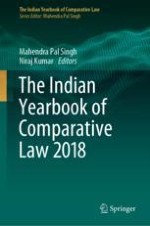2019 | OriginalPaper | Chapter
16. The Immutability of the Marital Exemption Clause in the Indian Rape Law
Author : B. B. Pande
Published in: The Indian Yearbook of Comparative Law 2018
Publisher: Springer Singapore
Activate our intelligent search to find suitable subject content or patents.
Select sections of text to find matching patents with Artificial Intelligence. powered by
Select sections of text to find additional relevant content using AI-assisted search. powered by
